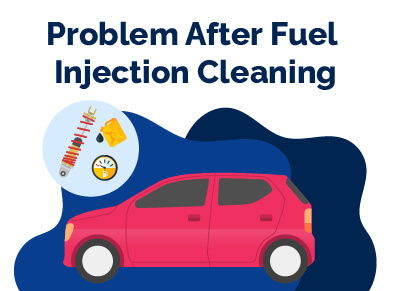Problems After Fuel Injection Cleaning
July 21, 2023


Chris is Head of Content for FindTheBestCarPrice and is based out of Philadelphia, PA. As a seasoned automotive industry analyst and car enthusiast, he ensures the highest level of quality across all our content and curates our picks for the best deals each month.
Chris studied information systems and marketing at Drexel University and writes about a wide range of topics ranging from car buying tips to troubleshooting common mechanical issues.
When he’s not thinking about cars, he likes to stay in with his dog and make an “attempt” to finish a crossword puzzle (he’s not quite at the Saturday/Sunday level…yet). As a former cheesemonger, Chris still has a “sharp” passion for all things cheese, and his fridge is always loaded with it!
Chris also has a passion for things that go fast, and drones are no exception. He spends some of his time writing for Dronesourced.
Numerous contemporary automobiles have replaced the archaic carburetor with an efficient fuel injector. After extensive use, it is advisable to administer fuel injector cleaner to preserve your vehicle's pristine condition, alleviating issues such as obstructions, engine sputtering, or suboptimal idling.
In the context of modern vehicular hygiene and safety, fuel injection ranks as one of the most crucial components. It is indispensable in ensuring that your vehicle delivers the requisite power and operates with unprecedented fluidity.
Despite the cleansing efforts, many drivers face complications with their fuel injection systems for various reasons. This is a pervasive issue; however, you can take remedial measures to address it.
This article covers all the problems that usually arise after fuel injection cleaning.
Table of Contents
- How Fuel Injectors Work
- How Often Should Fuel Injectors Be Cleaned
- Problems After Fuel Injection Cleaning
- 1. The Car Would Run Slower Than Usual
- 2. The Car Would Idle Very Poorly
- 3. You Might Need a New Throttle Body
- 4. Check Engine Light Comes On
- 5. Car Refuses To Start
- 6. Knocking Sound When Idle
- 7. Damaged Catalytic Converter
- 8. Decreased Performance
- 9. Clogged Fuel Filter
- 10. Replacement of Oxygen Sensors
- 11. Faulty Ignition System
- 12. Fuel Tanks Could Develop Faults
- Fuel Injectors Replacement Cost
- Best Car Deals by Category
How Fuel Injectors Work
Fuel injectors play a pivotal role in supplying gasoline to a vehicle's engine to enable its operation.
These devices release pressurized fuel droplets into the intake manifold to combine with air and create a combustion mixture with optimal properties.
Essentially, they serve as tiny fuel pumps that increase the fuel pressure to maximize engine efficiency.
When a driver ignites their vehicle, the car's computer transmits electrical signals to the fuel injector to dispense the appropriate amount of fuel to each cylinder in the engine.
This is based on input gathered from various sensors in the exhaust system, including mass air flow, oxygen, and temperature sensors.
The fuel injector then disperses the fuel in atomized form, breaking it into tiny droplets and spraying it into the intake manifold.
The fuel enters the engine cylinders, where pistons compress it. Once the spark plugs ignite the fuel-air mixture, a chain reaction generates power to move the vehicle's wheels. After combustion, the exhaust gases exit an exhaust valve and leave the vehicle.
Although fuel injectors are typically long-lasting and dependable, they can deteriorate from dirt accumulation or corrosion caused by moisture buildup, leading to clogs or malfunctions.
As a result, they may need more fuel to satisfy demand or disperse the fuel accurately, resulting in poor engine output. Performing routine fuel injector checks and cleanings is essential to ensure their reliable functioning.
How Often Should Fuel Injectors Be Cleaned
Generally, most modern vehicles require fuel injection servicing every 30,000 miles. During this maintenance process, professionals examine the injector system and, if necessary, flush the fuel with a cleaning agent. Other components, such as spark plugs and air filters, may also be replaced.
If your automobile is older or has yet to receive maintenance, replacing the fuel injector system every 60,000 miles may be necessary.
Despite being current with maintenance, having your injectors inspected professionally once a year or following your owner's manual's recommendations is a wise choice.
In dusty or sandy driving conditions, cleaning your injectors more often may be beneficial. With time, dirt and debris can accumulate in the fuel lines and obstruct the injector, resulting in reduced performance or engine damage.
For optimal vehicle performance, cleaning your fuel injection system at least every 15,000 miles in dusty or sandy conditions is recommended. A fuel injection service every 30,000 miles should be sufficient if your car operates under normal conditions.
Problems After Fuel Injection Cleaning
Given the perpetual demand for the upkeep of fuel injection systems, it is unsurprising that most require periodic cleaning.
Nevertheless, subjecting your fuel injection system to cleansing procedures exacts a toll on it, and failure to use an appropriate cleaner entails certain risks. These risks encompass the following:
1. The Car Would Run Slower Than Usual
A prevalent difficulty is that your vehicle may run slower than optimal after fuel injection cleaning. If you encounter this issue, an obstruction within the system is probably the culprit.
Pinpointing the location of the obstruction is only sometimes feasible from an external assessment, but a trained professional should be able to diagnose the problem.
The obstruction may emanate from a clogged or jammed fuel injector or a dirty fuel filter. Regardless of the root cause, it is highly advisable to have this matter examined.
2. The Car Would Idle Very Poorly
Yet another prevalent issue that may arise following fuel injection cleaning is the suboptimal idling of the vehicle. In such an instance, scrutinizing the throttle position sensors is prudent.
Extended periods of revving during the cleaning process could damage these sensors. Further, a buildup of oil or debris in the sensors could impede their functionality.
3. You Might Need a New Throttle Body
A prevalent explanation for a widespread fuel injection system malfunction after cleaning is the need for a new throttle body.
This scenario often transpires due to the emergence of fissures or other impairments in the old throttle body. A similar outcome may occur if the system contains filth or other contaminants.
Regrettably, many people are unaware that this complication is commonplace. They may act rashly by abruptly shutting off the vehicle and demanding a refund without comprehending that their car may have underlying issues.
4. Check Engine Light Comes On
One of the most frequent problems that may occur after fuel injection cleaning is the illumination of the check engine light. There could be many diverse reasons for this occurrence, and it is imperative not to be unduly apprehensive about it.
The optimal course of action would be to engage the services of a trained professional to investigate the matter thoroughly and ascertain if any underlying problems are present.
For instance, one potential trigger for the light to turn on could be an improperly fastened gas cap.
Fuel leakage could ensue if the gas cap is loose and fails to seal correctly. Furthermore, an excess of air in the tank could also give rise to similar issues. Replacing the cap to ensure a proper seal is advisable to address this difficulty.
5. Car Refuses To Start
A prevalent issue that may arise after fuel injection cleaning is the engine's failure to start. Although it may sound peculiar, many individuals encounter this problem after their car undergoes cleaning.
The root cause could be the check engine light coming on, leading to the car's inability to start. If such an issue occurs, it is advisable to scrutinize the check engine light.
It is often overlooked that lights like these can illuminate for reasons other than an actual problem.
6. Knocking Sound When Idle
Some automobiles can produce a knocking sound during idling. Therefore, it's crucial to notice all the maintenance work done by your mechanic and assess the car's overall performance before departing.
Otherwise, unresolved problems could lead to further complications that may be noticed later.
7. Damaged Catalytic Converter
Another factor contributing to post-cleaning difficulties with your fuel injection system is potential harm to your catalytic converter.
This damage may occur due to reduced engine efficiency from the cleaning procedure, leading to detrimental effects on the converter's performance.
Additionally, if the car is not operated after cleaning, it can also contribute to such damage.
8. Decreased Performance
Following fuel injection cleaning, a frequent issue is decreased vehicle performance.
Several factors may contribute, including obstructed or dirty fuel filters, flawed or eroded throttle bodies, faulty sensors and bypass valves that lead to substandard engine performance, or inadequately strung plug wires. Additionally, a leaking valve seat could cause difficulty starting the engine.
9. Clogged Fuel Filter
A prevalent issue is the obstruction of the fuel filter within the fuel tank, which typically sifts residual impurities and particulate matter.
Consequently, insufficient fuel delivery to the engine may impede vehicular movement. Prompt replacement of the filter upon detecting malfunctioning is highly recommended.
10. Replacement of Oxygen Sensors
One of the most prevalent challenges that may emerge following fuel injection cleaning pertains to the need for new oxygen sensors.
Should any obstructions in the injection system arise, optimal functioning cannot be guaranteed.
The oxygen sensors are responsible for detecting the volume of oxygen in the exhaust, then relay this information to the engine control unit for efficient modulation of power. It is thus advisable to replace these sensors posthaste.
11. Faulty Ignition System
Another prevalent issue following fuel injection cleaning is related to the ignition system.
This problem often occurs due to inadequate cleaning of the entire system or insufficient cleaning of the fuel injectors.
If dirt or debris remains within the system, it can accumulate on other components and obstruct their proper functioning.
Therefore, it is essential to ensure that all parts of the ignition system are thoroughly cleaned during the fuel injection cleaning process.
12. Fuel Tanks Could Develop Faults
Several individuals who report difficulties after cleaning fuel injectors encounter issues associated with their fuel tanks. Some estimates suggest that over 80% of such complainants experience problems in this area.
Fuel Injectors Replacement Cost
Most fuel injector malfunctions can be resolved through professional cleaning or by replacing the O-rings if a leak occurs.
However, replacement is imperative in cases where the fuel injector has cracked or broken, and the cost can be high.
While fuel injectors are distinct, they are engineered to operate collectively with the other injectors. Consequently, when considering whether to replace only one or all injectors, it is almost always recommended to replace all of them.
The cost of a complete fuel injector replacement will vary depending on your vehicle's make and model.
As a general rule, it is expected that the expenditure for a fuel injector replacement shall be in the ballpark of $800 to $1,450, with the parts accounting for approximately $600 to $1,200. In comparison, the associated labor costs usually range between $200 and $250.
Best Car Deals by Category
Posted in Car Buying Tips, Car Troubleshooting |




